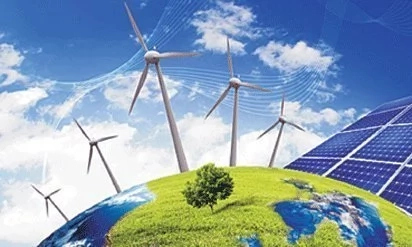Nigeria is reputed to have an abundance of renewable energy resources of which, most of these sources such as, solar, and wind, and biomass as well as, small hydropower are all the most ubiquitous.
The Nigerian Electricity Regulatory Commission (NERC) has actually shown commitment towards stimulating investment in the area of renewable energy generation in the country.
👉 Relocate to Canada Today!
Live, Study and Work in Canada. No Payment is Required! Hurry Now click here to Apply >> Immigrate to CanadaGiven the vast and perhaps, mostly untapped potential in country’s renewable energy resources, the NERC has already put up a target which is to generate a minimum of 2,000MW of electricity, particularly from renewables by 2020. However, the commission has finished drafting the main features of the programme.
Read Also: Status of Renewable Energy in Nigeria

The Main Features:
The main features include the following:
- Guaranteed price and also access to the grid, and
- Feed-In – that is, Tariff for Solar, and Wind, and Biomass and Small Hydro, and
- Power Purchase Agreement (PPA), which of course, is based on the plant life cycle of about 20 years
This company, the Electricity distribution companies (DisCos) is expected to purchase at least, a minimum of 1000MW, that is about 50 per cent of the projected renewable energy sourced electricity in the country.
Another company, this time, the Nigerian Bulk Electricity Trading Company (NBET) is also expected to purchase a minimum of 1000MW, it is also about 50 per cent of all the projected renewable sourced electricity in Nigeria.
However, in accordance with the National Policy on Renewable Energy as well as, Energy Efficiency, the NERC has deemed wise to approve three windows specifically for grid-connected renewable energy projects in the country.
Read Also: Renewable Energy in Nigeria: Meaning, Uses, Challenges and Prospects
Windows for Grid-Connected Renewable Energy
Below are the windows for grid-connected renewable energy projects in Nigeria:
- Net-metering for very small capacities, that is, capacities that are below 1MW
- Feed-in, that is, the tariff for capacities that are up to
- 5 MW of solar, and
- 10 MW of wind, and
- 10 MW of Biomass as well as,
- 30MW of small hydro.
- A competitive tender was another window for capacities above the thresholds and was to be procured via NBET.
In the pursuit of its regulatory responsibility, the NERC had in the year, 2015, established a feed-in tariff just for the renewable energy based power generation in the country.
👉 Relocate to Canada Today!
Live, Study and Work in Canada. No Payment is Required! Hurry Now click here to Apply >> Immigrate to CanadaRenewable Energy Master Plan REMP
The Renewable Energy Master Plan (REMP) in Nigeria is considered as a policy, which are to be implemented by country’s Federal Ministry of Environment with the sole aims of increasing the contribution of renewable energy in the country to account for about 10 percent of all the energy consumed in the country by the year, 2025.
The production of the Renewable Energy Masterplan for Nigeria actually took place in 2006 and was supported by the UNDP.
The Renewable Energy Master Plan (REMP) is articulating the vision the country, as well as, sets out a kind of road map for the purpose of increasing the role of renewable energy so as to achieve sustainable development.
The renewable energy policy at most is addressing Nigeria’s need in the area of increased electricity supply, and improved grid reliability, as well as, security.
Read Also: Electricity in Nigeria – Causes Poor Power Supply, and Possible Solutions
Nigerian Energy Policies
The Nigerian energy policies as well as, the strategies can simply be summarized in this article for the purpose of providing an insight into the policies of renewable energy in Nigeria, and quite a number of them are discussed below.
National Electric Power Policy (NEPP), 2001
The National Electric Power Policy (NEPP) was actually the first when it comes to reform in the country’s power sector. And this comes through the recommendations of the Electrical power implementation Committee (EPIC), and this body was in charge of the reforms as well as, the transformation of the country's power sector in 1999.
National Energy Policy (NEP), 2003, 2006, 2013
Before 2003 when the Federal Government approved the energy policy, there was no comprehensive energy policy in the country.
The one that was established as the National Energy Policy (NEP) and was actually developed by a commission called, Energy Commission of Nigeria (ECN).
National Economic Empowerment & Development Strategy, 2004
This policy the National Economic Empowerment and Development Strategy (NEEDS) was actually put together by the National Planning Commission in the year, 2004 and, the purpose was to eradicate poverty in Nigeria. At this development, there was a suggestion to create renewable energy agency and technologies and was to be funded by National Power Sector Reform Act.
National Power Sector Reform Act (EPSRA), 2005
The National Power Sector Reform Act put together in the year, 2005 was for the insurance of the liberalization of the power sector in the country.
Renewable Electricity Policy Guidelines (REPG), 2006
This policy was put together under the federal Ministry of Power and Steel in, 2006, the Renewable Electricity Policy Guidelines (REPG) advised the federal government on the need for expansion of electricity generation, especially from renewables.
Read Also: TCN restores electricity supply after fire incident
Renewable Electricity Action Programme (REAP), 2006
The policy was put together with respect to the REPG by the Ministry of Power and Steelyear year 2006.. It was the Renewable Electricity Action Programme (REAP) that set out a roadmap to be followed in the implementation of the REPG.
Nigerian Biofuel Policy and Incentives (NBPI), 2007
The objective of this policy was on the promotion of the local fuel ethanol industry by utilizing agricultural products, as was according to the federal government’s directive on an Automotive Biomass Programme for the country.
Renewable Energy Master Plan (REMP) 2005 and 2012
It was the Energy Commission of Nigeria (ECN) that developed this and was in collaboration with the United Nations Development Programme (UNDP) in the year, 2005, and that, it was reviewed again in 2012.
National Renewable Energy and Energy Efficiency Policy (NREEEP), 2014
NREEEP actually outlines the global thrust enshrined in the policies as well as measures for promoting renewable energy and also energy efficiency.
The NREEEP was in 2014 developed by the FMP and was to be approved by the Nigerian Federal Executive Council.
Multi-Year Tariff Order (MYTO), 2008 and 2012
A 15-year roadmap was developed in 2008 to provide for cost-reflective tariffs, which was called the Multi-Year Tariff Order (MYTO 1), and it was the Nigerian Electricity Regulatory Commission NERC that developed it.
Draft Rural Electrification Strategy and Implementation Plan (RESIP), 2014
There was a Power Sector Reform team that prepared the Rural Electrification Strategy and Implementation Plan in the year, 2006 (RESIP, 2006).
After that, a committee was set, which reviewed the power sector and as well redrafted the RESIP in the year 2014.
Read Also: Impact of Electricity Tariff Increase on Nigerian Economy
Conclusion
Given the vast and perhaps, mostly untapped potential in country’s renewable energy resources, the NERC has already put up a target which is to generate a minimum of 2,000MW of electricity, particularly from renewables by 2020.
